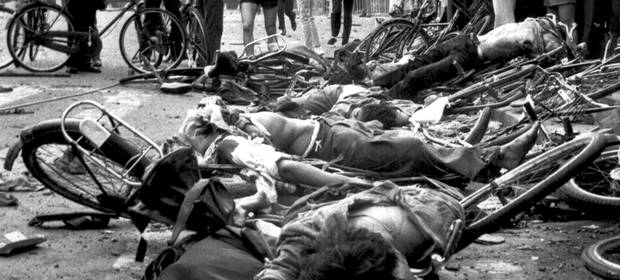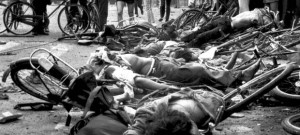Tiananmen Square 25th anniversary of Students Massacre by Chinese Dictators
Every Fourth of June 1989 we remember two events , the People’s army that was founded for the people turned on its guns to the unarmed citizens of Peking to destroy a peaceful student-led democracy movement. And we remember also in Tibet in the end of 1950’s the unarmed monks were shot in cold blood in Lhasa by the same so called ” People’s Army”, and since the country has been occupied and depopulated continually from its original inhabitants to this day.
Since June 4, 1989, when the People’s Liberation Army (PLA) opened fire in and around Beijing’s Tiananmen Square killing a still unknown number of students, the Communist Party has tried to airbrush the event from Chinese history. Schools do not teach it, domestic media are forbidden from discussing it, and activists who invoke its memory have been harassed and even jailed.
Leaders of the protest, including Liu Xiaobo, the winner of last year’s Nobel Peace prize, urged the students to depart the square, and the Chilean diplomat relayed that “once agreement was reached for the students to withdraw, linking hands to form a column, the students left the square through the south east corner.” The testimony contradicts the reports of several journalists who were in Beijing at the time, who described soldiers “charging” into unarmed civilians and suggests the death toll on the night may be far lower than the thousands previously thought.

Many foreign reporters started crying “If this is the People’s Army, God spare China.” They behaved like the Red Guards, with a systematic and frenzied brutality. They were the very institution that was once called out to protect China from the Red Guard excesses. Now they are killing civilians.
The anniversary of the date on which troops shot their way into central Beijing in 1989 has never been publicly marked in mainland China, though every year there are commemorations in Hong Kong.
The government has never released a death toll for the crackdown, but estimates from human rights groups and witnesses range from several hundred to several thousand.
Xi’s administration has intensified pressure on dissent, detaining and jailing activists, clamping down on Internet critics and tightening curbs on journalists in what rights groups call the worst suppression of free expression in recent years.
At one stage some students came from side streets, shouting “go home, go home” to stalled lorries outside the leadership compound. They were scattered by militia men with clubs like axe-handles, which cracked a few skulls. It was probably the one occasion during the night when they did not use guns.
Along the tree-lined streets beside the Forbidden City, groups of people were talking softly, scared but curious.. About half an hour later some of the armour returned again from the square, and in a continuing moving circle, they opened fire all around. It was a battlefield. It was a lesson in brute powerThe world was weeping for the people of Peking. One cannot see how they are ever likely to trust their leaders again.
Ahead of the 25th anniversary of the Chinese government’s deadly June 4, 1989 crackdown on student protests in Tienanmen Square, Beijing is casting a wide net to round up would-be agitators. The government has “routinely tightened control over activists as well as relatives of those who died during the protests” before the June 4 anniversary and “continues to deny any wrong-doing,” according to Human Rights Watch, but this year’s roundup seems especially thorough. What’s also striking is the advanced age of many of the detainees: because the event was 25 years ago, many of the “grownups” who witnessed it, publicly denounced it, and continue to mark it are now of retirement age (though many continue to write, teach and report).



